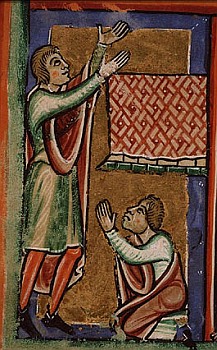
Central Idea: God is just and merciful. Doctrine: Justification. Practical Application: A life of justice and mercy.
To view Lectionary 150, click here.
Central Idea: God is just and merciful
Reading 1 Sir 35:12-14, 16-18
- How can God be just and yet have a special concern for the lowly and those who serve him willingly? The reason is that these persons suffer from injustice the most, spurring God’s just response.
Responsorial Psalm Ps 34:2-3, 17-18, 19, 23
The Lord hears the cry of the poor.
- God saves those who ask him to: those who suffer and those who serve him. In the atonement, Our Lord has taken all human suffering to himself, including it in his sacrificial offering which redeems the world.
Reading 2 2 Tm 4:6-8, 16-18
- St. Paul has been a faithful servant of God, has suffered in this service, and is not done suffering yet. He is confident that “the Lord, the just judge” will bring him “safe to his heavenly kingdom” as a reward.
Gospel Lk 18:9-14
- St. Luke’s comment makes the meaning of Christ’s parable clear: If you are convinced you are holy but look down on everyone else as a lost sinner, you are a fool in great danger.
- Yet each one of us lives out this parable. Our true condition is a poor sinner in need of God’s mercy. Yet seeing this is abhorrent to us, so we try to convince others and ourselves that we are just. The Holy Spirit can slowly show us what we are. This is painful but it reveals us as widows, orphans, poor, brokenhearted, oppressed, and in need of justification. This breaking down process opens us up to serve God in justice so God will stand beside us and bring us safely to heaven.
Doctrine: Justification
- According to Fr. John Hardon’s Modern Catholic Dictionary, divine justice is “The constant and unchanging will of God to give everyone what is due him or her.”
- The great work of divine mercy, accomplished by Our Lord, is our justification, our being brought back into friendship with God through the forgiveness of our sins and through our being made children of God. The Catechism of the Catholic Church teaches that justification is closely linked with grace, merit, and Christian holiness (CCC 1987-2029).
- The grace the Holy Spirit, conferred on us through faith and Baptism, gives us God’s righteousness (CCC 2017). “Moved by grace, man turns toward God and away from sin, and so accepts forgiveness and righteousness from on high” (CCC 2018). This act of justification forgives our sins, makes us holy, and inwardly transforms us (CCC 2019). All this happens through the merit of Christ (CCC 2020).
Practical Application: A life of justice and mercy
- We cannot remain in a state of justice unless we live the virtue of justice, or giving every person what we owe him. God is a person, too, and we owe him adoration, thanks, reparation, and petition. Our life is full of both natural duties (like honoring parents) and of freely accepted obligations (like employment).
- “So if you are offering your gift at the altar, and there remember that your brother has something against you, leave your gift there before the altar and go; first be reconciled to your brother, and then come and offer your gift”(Mt 5:23-24).
- If we lose the state of grace, we can recover justification through the sacraments of healing, especially Confession. However, we cannot be forgiven unless we forgive those who offend us.
- In addition to giving others what we own them, we also must live lives of mercy. This means giving (in the language of stewardship) our time, talents, and treasure.
Leave a Reply